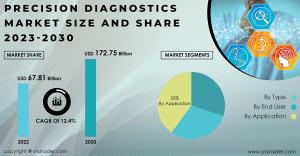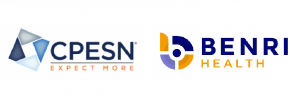Precision Diagnostics Market Shows Exponential Growth, 12.4% CAGR Projected as Genetic Testing, Esoteric Assays Drive Targeted Disease Management
AUSTIN, TEXAS, UNITED STATES, May 17, 2024 /EINPresswire.com/ — The global Precision Diagnostics Market Size was valued at USD 67.81 billion in 2022 and is expected to be worth around USD 172.75 billion by 2030, growing at a CAGR of 12.4% from 2023 to 2030. Propelling this significant expansion is the rapid advancement of personalized medicine approaches harnessing sophisticated diagnostic tests to enable targeted, individualized disease prevention, detection and treatment.
Precision diagnostics encompass a range of advanced clinical tests and analytical techniques designed to elucidate the molecular and genetic underpinnings of diseases and conditions. By evaluating an individual’s specific biomarkers, genetic variations and other molecular fingerprints, precision diagnostics facilitate customized care tailored to a patient’s unique biological profile rather than generalized population statistics.
“The era of precision diagnostics represents a paradigm shift in healthcare from reactive, one-size-fits-all interventions toward proactive, precision-guided regimens optimized for each patient,” said Dr. Simone Amato, Chair of Molecular Diagnostics at Stanford University Medical Center. “By elucidating the molecular drivers of disease, we can stratify patients, identify optimal therapies, minimize toxicities and ultimately improve outcomes.”
Download Free Sample Report of Precision Diagnostics Market @ https://www.snsinsider.com/sample-request/2991
Rising Prevalence of Chronic Diseases Driving Adoption
A major catalyst fueling precision diagnostics is the alarming rise in chronic diseases like cancer, cardiovascular disorders and autoimmune conditions globally. The World Health Organization estimates these noncommunicable diseases account for over 70% of deaths worldwide annually, exacting a tremendous burden. As the population ages and environmental risk factors persist, these disease rates are projected to escalate further.
In this landscape, precision diagnostics have emerged as a linchpin to combat chronic diseases through personalized risk assessment, early detection, molecularly-informed treatment selection and monitoring therapeutic responses. For example, liquid biopsy tests analyzing circulating tumor DNA can detect cancer recurrence months earlier than conventional diagnostics. Similarly, genetic tests like BRCA screening facilitate preemptive interventions for cancer prevention based on hereditary risk profiles.
“When it comes to managing complex chronic diseases, timing and tailoring matter immensely,” explained Dr. Amato. “Precision diagnostics empower clinicians to get ahead of disease progression and make more informed treatment decisions for optimal patient outcomes.”
Technological Convergence Accelerating Capabilities
The surging capabilities and clinical adoption of precision diagnostics are being catalyzed by a powerful convergence of technological innovations across genomics, proteomics, metabolomics, bioinformatics and other disciplines. Next-generation sequencing platforms have become increasingly affordable and robust, fueling the widespread adoption of genetic and molecular profiling tests. In parallel, advanced mass spectrometry, microarray technologies and other analytical techniques are enhancing protein, metabolite and biomarker detection sensitivities.
Furthermore, the integration of artificial intelligence, machine learning and big data analytics is revolutionizing how these complex molecular datasets are parsed to generate actionable clinical insights. AI-powered algorithms can detect subtle patterns and biomarker signatures eluding traditional analytical methods, streamlining disease detection, subtyping and therapy selection.
This multidisciplinary convergence has given rise to a plethora of novel diagnostic tests spanning oncology, cardiovascular disease, immunology, neurological disorders and other disease areas. For instance, gene expression profiling tests evaluating mRNA biomarker panels are transforming cancer diagnosis and enabling more precise chemotherapy regimen selection.
Market Segmentation and Regional Landscape
Within the precision diagnostics market, the genetic testing segment encompassing tests evaluating inherited genetic variations, chromosomal abnormalities and molecular mutations is expected to experience the highest growth. However, the esoteric testing segment analyzing proteins, metabolites and other complex biomolecules will likely retain the overall largest market share, particularly for oncology and cardiovascular applications.
From an end-user perspective, the clinical laboratories segment performing these advanced diagnostic tests will command the lion’s share of revenue. However, hospital-based precision diagnostics are projected for accelerated adoption as healthcare providers strive to consolidate testing within integrated delivery networks.
Geographically, North America currently leads the precision diagnostics market, bolstered by high healthcare spending, early technology adoption and a robust clinical research environment. However, the Asia Pacific region is anticipated to exhibit the most rapid growth in the coming years as nations like China, India and others prioritize precision medicine initiatives and expand molecular diagnostic testing accessibility.
Have Any Query? Ask Our Experts @ https://www.snsinsider.com/enquiry/2991
Key Takeaways:
– Precision diagnostics market projected to surge from $67.81B in 2022 to $172.75B by 2030
– 12.4% CAGR driven by personalized medicine, rise of chronic diseases globally
– Genetic tests for profiling and esoteric molecular assays to see high growth
– Technological convergence of genomics, proteomics, AI enhancing capabilities
– Clinical laboratories largest end-user segment; hospitals poised for robust adoption
– North America leads currently, but Asia Pacific to be fastest growth region
As healthcare continues its inexorable shift toward proactive, personalized patient management, precision diagnostics will become increasingly indispensable across all clinical settings. While challenges surrounding reimbursement, regulatory harmonization and workforce training remain, the substantial clinical and economic benefits of targeted treatment will likely drive widespread adoption. The precision diagnostics revolution is poised to fundamentally transform disease management while catalyzing a trillion-dollar drug/diagnostic co-development market.
List of Precision Diagnostics Companies Profiled in Report:
• Quest diagnostics
• Bayer AG
• Koninklijke Philips N.V.
• QIAGEN
• Swiss Precision Diagnostics
• Novartis AG
• Koninklijke Philips N.V
• Sanofi
• Lantheus Medical Imaging
• Bluebird Bio
• (To view Full list of companies, Ask for Sample Report)
Precision Diagnostics Market Segmentation as Follows:
By Type
• Genetic Tests
• Esoteric Tests
• Others
By Application
• Oncology
• Cardiovascular
• Immunology
• Others
By End User
• Hospitals
• Clinical Laboratories
• Homecare
Check Discount on This Report @ https://www.snsinsider.com/discount/2991
Table of Content
Chapter 1 Introduction
Chapter 2 Research Methodology
Chapter 3 Precision Diagnostics Market Dynamics
Chapter 4 Impact Analysis (COVID-19, Ukraine- Russia war, Ongoing Recession on Major Economies)
Chapter 5 Value Chain Analysis
Chapter 6 Porter’s 5 forces model
Chapter 7 PEST Analysis
Chapter 8 Precision Diagnostics Market Segmentation, By Type
Chapter 9 Precision Diagnostics Market Segmentation, By Application
Chapter 10 Precision Diagnostics Market Segmentation, By End User
Chapter 11 Regional Analysis
Chapter 12 Company profile
Chapter 13 Competitive Landscape
Chapter 14 Use Case and Best Practices
Chapter 15 Conclusion
Continued…
Akash Anand
SNS Insider Pvt. Ltd
+1 415-230-0044
email us here
Visit us on social media:
Facebook
Twitter
LinkedIn
Instagram
YouTube
![]()
Originally published at https://www.einpresswire.com/article/712408306/precision-diagnostics-market-size-poised-to-soar-to-usd-172-75-bn-by-2030-fueled-by-personalized-medicine-advancements





